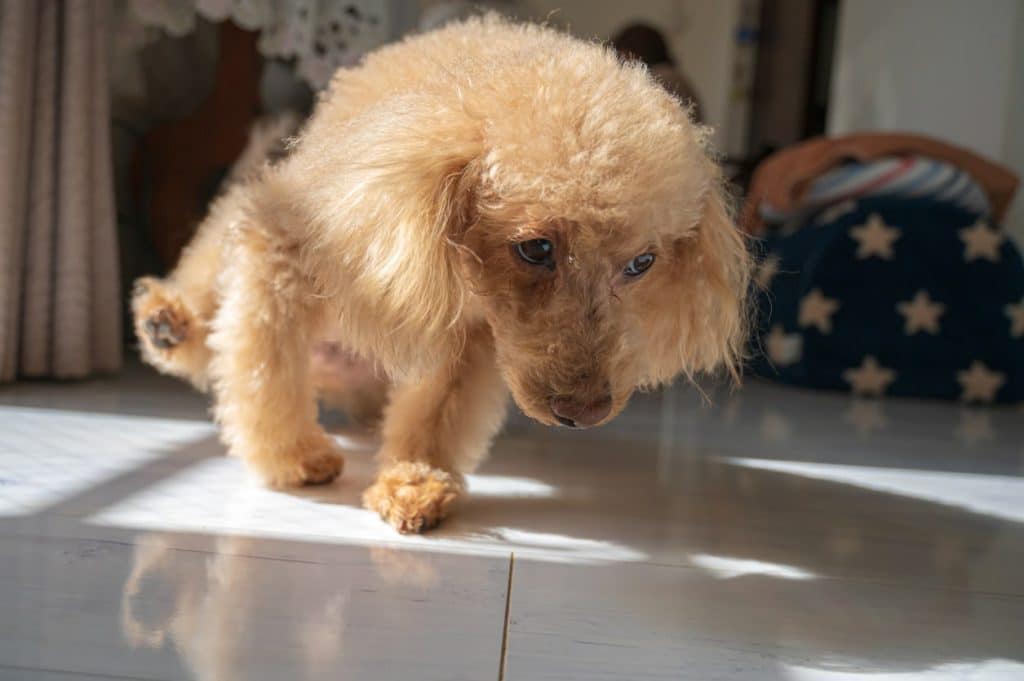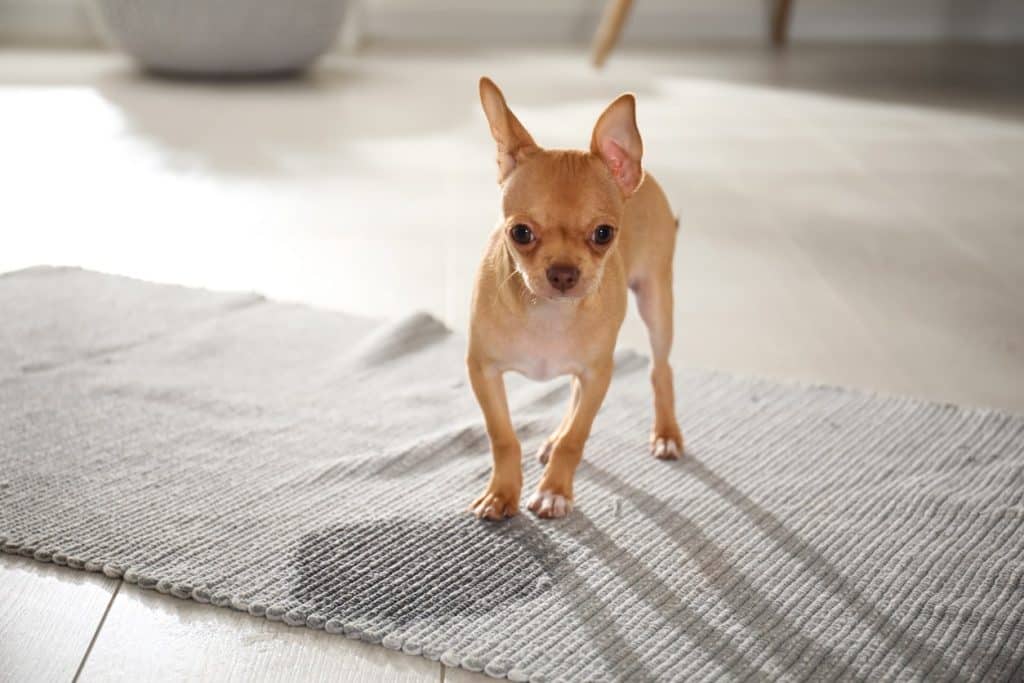Nothing is worse than coming home only to find your dog peeing on the floor when they see you. While this behaviour might be annoying, it’s instinctual. “Dogs may pee involuntarily when they’re extremely excited, scared, or feeling submissive,” explained Dr. Mollie Newton, founder of PetMeTwice. “When a dog shows submissive urination, it’s usually a gesture of respect towards a more dominant individual,” she said. Dr. Newton recommends thinking of it as your dog saying: “I’m not a threat; please be kind to me.”
We’ve rounded up some expert advice to explain this behaviour in more detail—and help your dog grow out of it.
Why Does My Dog Pee When They’re Excited, Scared, or Submissive?
Dr. Newton explains that usually, submissive urination happens when your dog is overstimulated. “Overstimulation, whether from excitement or fear, can trigger this involuntary response,” she says. “For example, a dog might pee when scared to show submission and avoid confrontation, while excitement urination is more about being overwhelmed by joyful emotions.”
Submissive urination isn’t the only reason your dog might be peeing inappropriately, so here are more details about some of the other possible causes.
They’re Not Fully House-Trained
Puppies and young dogs who aren’t fully potty trained can often pee themselves unexpectedly. Dr. Newton says this usually happens because they have less control over their bladder muscles, and it’s common in male and female dogs.
In younger puppies, submissive and excited urination should improve as they complete their housetraining and become more confident. Puppies older than 12 weeks may need some training reminders; these include learning how to hold their pee and when and where they can do their business.
They Had Traumatic Run-Ins With Humans Earlier In Life
“At the heart of submissive urination lies the emotion of fear,” explained Elena Rowe, co-founder of LabraJoy. “Think of it this way: if someone suddenly stared at you intensely or swiftly moved toward you, you’d likely feel threatened. Dogs, in their unique way, express this fear by urinating to convey submission and mitigate any perceived threats,” she explained.
If your dog had a traumatic incident early in life (which you may not know about, especially if they’re a rescue), then some situations, like unexpected guests, may cause them to feel frightened and pee themselves.
They Were Too Anxious While You Were Gone
It’s normal for our dogs to miss us while we’re away (and we miss them too!) However, separation anxiety can cause dogs to pee themselves when you return home. They may have been very anxious while you were away and then extremely excited when you return home.
When separation anxiety is the cause, your dog’s inappropriate urination may be a combination of excitement and submissive urination. If you’re worried that your dog is showing other signs of separation anxiety, including panic, reactive communication, and destructive behaviour, it’s best to speak to a qualified behaviourist for tailored advice.

iStock/Yuto photographer
How to Identify Submissive Urination
To tell the difference between excited urination and submissive urination, pay attention to the triggers around when your dog is peeing.
Some common behaviours that accompany submissive urination include:
- Crouching
- Tucking their tail
- Showing their belly
- Shaking
- Avoiding eye contact
Submissive urination tends to (but not always) occur:
- During interaction with humans
- During or after loud noises
- When being scolded
- When meeting a more assertive dog
- When meeting strangers
- When in an unfamiliar environment
In contrast, excitement urination is more likely to happen during active play sessions, when you return home, or when your dog meets strangers. Often, a puppy’s inappropriate urination is down to a housetraining regression, but if it’s accompanied by any of the signs or scenarios above, it may be more likely to be submissive urination.
Lastly, pet parents should rule out territorial urination, like spraying and marking. “Marking behaviour in dogs is like humans leaving a signature or a stamp on a document,” Rowe explains. “It’s a way for dogs to claim territory or send messages to their peers.”
How Can I Tell If Inappropriate Urination Is a Medical Problem?
If you observe your dog urinating abnormally, it might not be down to excitement or submissive urination. Instead, one of the following medical conditions might be at fault.
- Urinary tract infections. Look for signs like frequent, painful urination or blood in the urine.
- Urinary stones. These can cause difficulty urinating, dribbling pee, and frequent urination.
- Incontinence. Often seen in female dogs, incontinence is linked to a weaker bladder and involves leaking urine, usually when your dog is lying down.
- Joint pain. If your dog can’t comfortably move around to pee normally, they may pee in places you don’t expect.
Dr. Newton says it’s essential to see a vet in these situations. They can accurately identify the issue and provide advice on how to give proper care and support.

iStock/Liudmila Chernetska
How to Prevent Your Dog from Peeing When Excited or Scared
The good news is that with proper dog training, pet parents can guide their dogs away from peeing when they’re excited or scared. The key is positive reinforcement training—and plenty of patience.
Avoid any big or loud movements during these sessions. Keep your dog calm and quiet, avoiding eye contact and loud noises. Rowe suggests following this game plan:
- Interact with your dog gently and calmly.
- Avoid confrontations.
- Reward your dog’s good behaviour with treats and gentle praise.
- Don’t scold or yell at your dog (these are common training mistakes)
Additionally, keep to a consistent toilet break schedule and vigorous play sessions outside. If your dog’s inappropriate urination is linked to a specific trigger, take steps to desensitise them to that trigger.



